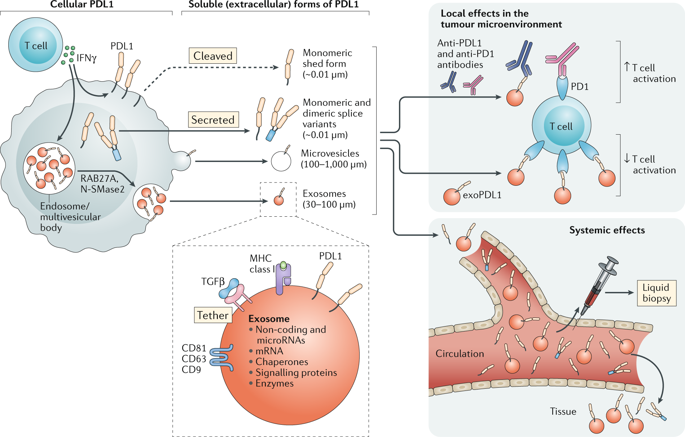当前位置:
X-MOL 学术
›
Nat. Rev. Immunol.
›
论文详情
Our official English website, www.x-mol.net, welcomes your
feedback! (Note: you will need to create a separate account there.)
The importance of exosomal PDL1 in tumour immune evasion.
Nature Reviews Immunology ( IF 67.7 ) Pub Date : 2020-01-21 , DOI: 10.1038/s41577-019-0264-y Dhouha Daassi 1 , Kathleen M Mahoney 1, 2 , Gordon J Freeman 1
Nature Reviews Immunology ( IF 67.7 ) Pub Date : 2020-01-21 , DOI: 10.1038/s41577-019-0264-y Dhouha Daassi 1 , Kathleen M Mahoney 1, 2 , Gordon J Freeman 1
Affiliation

|
The interaction of programmed cell death 1 ligand 1 (PDL1) with its receptor programmed cell death 1 (PD1) inhibits T cell responses, and blockade of this interaction has proven to be an effective immunotherapy for several different cancers. PDL1 can be expressed on the surface of tumour cells, immune cells and other cells in the tumour microenvironment but is also found in extracellular forms. Recent studies have explored the importance of different forms of extracellular PDL1, such as on exosomes or as a freely soluble protein, and have shown that PDL1-expressing exosomes can inhibit antitumour immune responses. In patients with melanoma, exosomal PDL1 is also a marker of immune activation early after initiation of therapy with PD1-blocking antibodies and predicts a clinical response to PD1 blockade. In this Progress article, we highlight recent insights into the role of exosomal PDL1 in immune oncology and how it may be useful as a biomarker for the management of cancer or to define a subset of patients who would benefit from therapeutics that block exosome production.
中文翻译:

外体PDL1在肿瘤免疫逃逸中的重要性。
程序性细胞死亡1配体1(PDL1)与受体的程序性细胞死亡1(PD1)的相互作用抑制T细胞反应,而这种相互作用的阻断已被证明是对几种不同癌症的有效免疫疗法。PDL1可以在肿瘤微环境中的肿瘤细胞,免疫细胞和其他细胞的表面表达,但也以细胞外形式表达。最近的研究探索了不同形式的细胞外PDL1的重要性,例如在外泌体上或作为自由可溶性蛋白,并且已经表明表达PDL1的外泌体可以抑制抗肿瘤免疫反应。在黑色素瘤患者中,外泌体PDL1也是用PD1阻断抗体开始治疗后早期的免疫激活标志物,并预测对PD1阻断的临床反应。在此进度文章中,
更新日期:2020-01-21
中文翻译:

外体PDL1在肿瘤免疫逃逸中的重要性。
程序性细胞死亡1配体1(PDL1)与受体的程序性细胞死亡1(PD1)的相互作用抑制T细胞反应,而这种相互作用的阻断已被证明是对几种不同癌症的有效免疫疗法。PDL1可以在肿瘤微环境中的肿瘤细胞,免疫细胞和其他细胞的表面表达,但也以细胞外形式表达。最近的研究探索了不同形式的细胞外PDL1的重要性,例如在外泌体上或作为自由可溶性蛋白,并且已经表明表达PDL1的外泌体可以抑制抗肿瘤免疫反应。在黑色素瘤患者中,外泌体PDL1也是用PD1阻断抗体开始治疗后早期的免疫激活标志物,并预测对PD1阻断的临床反应。在此进度文章中,





















































 京公网安备 11010802027423号
京公网安备 11010802027423号